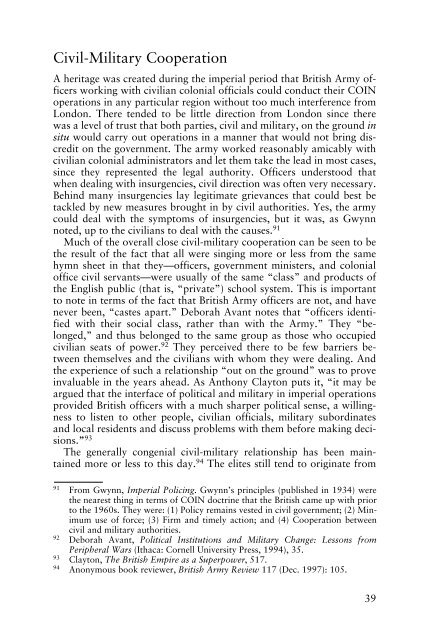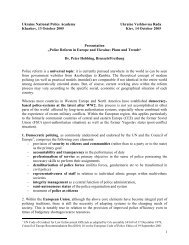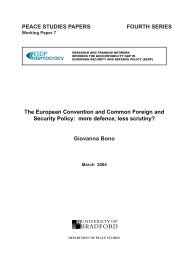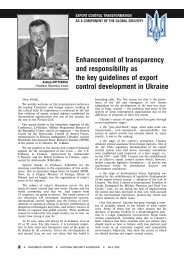combating terrorism and its implications for the security sector - DCAF
combating terrorism and its implications for the security sector - DCAF
combating terrorism and its implications for the security sector - DCAF
You also want an ePaper? Increase the reach of your titles
YUMPU automatically turns print PDFs into web optimized ePapers that Google loves.
Civil-Military Cooperation<br />
A heritage was created during <strong>the</strong> imperial period that British Army officers<br />
working with civilian colonial officials could conduct <strong>the</strong>ir COIN<br />
operations in any particular region without too much interference from<br />
London. There tended to be little direction from London since <strong>the</strong>re<br />
was a level of trust that both parties, civil <strong>and</strong> military, on <strong>the</strong> ground in<br />
situ would carry out operations in a manner that would not bring discredit<br />
on <strong>the</strong> government. The army worked reasonably amicably with<br />
civilian colonial administrators <strong>and</strong> let <strong>the</strong>m take <strong>the</strong> lead in most cases,<br />
since <strong>the</strong>y represented <strong>the</strong> legal authority. Officers understood that<br />
when dealing with insurgencies, civil direction was often very necessary.<br />
Behind many insurgencies lay legitimate grievances that could best be<br />
tackled by new measures brought in by civil authorities. Yes, <strong>the</strong> army<br />
could deal with <strong>the</strong> symptoms of insurgencies, but it was, as Gwynn<br />
noted, up to <strong>the</strong> civilians to deal with <strong>the</strong> causes. 91<br />
Much of <strong>the</strong> overall close civil-military cooperation can be seen to be<br />
<strong>the</strong> result of <strong>the</strong> fact that all were singing more or less from <strong>the</strong> same<br />
hymn sheet in that <strong>the</strong>y—officers, government ministers, <strong>and</strong> colonial<br />
office civil servants—were usually of <strong>the</strong> same “class” <strong>and</strong> products of<br />
<strong>the</strong> English public (that is, “private”) school system. This is important<br />
to note in terms of <strong>the</strong> fact that British Army officers are not, <strong>and</strong> have<br />
never been, “castes apart.” Deborah Avant notes that “officers identified<br />
with <strong>the</strong>ir social class, ra<strong>the</strong>r than with <strong>the</strong> Army.” They “belonged,”<br />
<strong>and</strong> thus belonged to <strong>the</strong> same group as those who occupied<br />
civilian seats of power. 92 They perceived <strong>the</strong>re to be few barriers between<br />
<strong>the</strong>mselves <strong>and</strong> <strong>the</strong> civilians with whom <strong>the</strong>y were dealing. And<br />
<strong>the</strong> experience of such a relationship “out on <strong>the</strong> ground” was to prove<br />
invaluable in <strong>the</strong> years ahead. As Anthony Clayton puts it, “it may be<br />
argued that <strong>the</strong> interface of political <strong>and</strong> military in imperial operations<br />
provided British officers with a much sharper political sense, a willingness<br />
to listen to o<strong>the</strong>r people, civilian officials, military subordinates<br />
<strong>and</strong> local residents <strong>and</strong> discuss problems with <strong>the</strong>m be<strong>for</strong>e making decisions.”<br />
93<br />
The generally congenial civil-military relationship has been maintained<br />
more or less to this day. 94 The elites still tend to originate from<br />
91 From Gwynn, Imperial Policing. Gwynn’s principles (published in 1934) were<br />
<strong>the</strong> nearest thing in terms of COIN doctrine that <strong>the</strong> British came up with prior<br />
to <strong>the</strong> 1960s. They were: (1) Policy remains vested in civil government; (2) Minimum<br />
use of <strong>for</strong>ce; (3) Firm <strong>and</strong> timely action; <strong>and</strong> (4) Cooperation between<br />
civil <strong>and</strong> military authorities.<br />
92 Deborah Avant, Political Institutions <strong>and</strong> Military Change: Lessons from<br />
Peripheral Wars (Ithaca: Cornell University Press, 1994), 35.<br />
93 Clayton, The British Empire as a Superpower, 517.<br />
94 Anonymous book reviewer, British Army Review 117 (Dec. 1997): 105.<br />
39

















